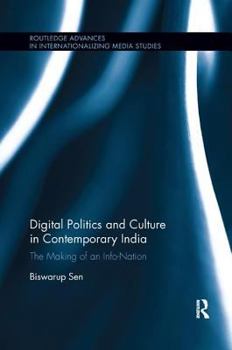Digital Politics and Culture in Contemporary India: The Making of an Info-Nation
Select Format
Select Condition 
Book Overview
The relationship between information and the nation-state is typically portrayed as a face-off involving repressive state power and democratic flows: Twitter and the Arab Spring, Google in China, WikiLeaks and the U.S. State Department. Less attention has been paid to those scenarios where states have regarded information and its diffusion as productive of modernity and globalization. It is the central argument of this book that the contemporary...
Format:Paperback
Language:English
ISBN:1138575763
ISBN13:9781138575769
Release Date:October 2017
Publisher:Routledge
Length:190 Pages
Weight:0.58 lbs.
Dimensions:0.4" x 6.0" x 9.0"
Customer Reviews
0 rating





